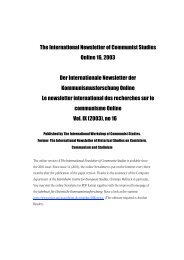INCS - Vol. X - The International Newsletter of Communist Studies ...
INCS - Vol. X - The International Newsletter of Communist Studies ...
INCS - Vol. X - The International Newsletter of Communist Studies ...
Erfolgreiche ePaper selbst erstellen
Machen Sie aus Ihren PDF Publikationen ein blätterbares Flipbook mit unserer einzigartigen Google optimierten e-Paper Software.
34 <strong>The</strong> <strong>International</strong> <strong>Newsletter</strong> <strong>of</strong> <strong>Communist</strong> <strong>Studies</strong><br />
Conrad Ulrich, whose actual Hungarian name was Sándor Nógrádi. In the 1930s, together<br />
with Henry Barbusse and Romain Rolland, Kellerman was the Secretary <strong>of</strong> the Amsterdam-<br />
Pleyell Movement. He was equally fluent in French, German, Czech, and the Slovak<br />
languages, and he spoke Russian, <strong>of</strong> course.<br />
<strong>The</strong> fifth reason worth mentioning is the organizational know-how and the international<br />
outlook. Among the Hungarians many were active in the home grown social democratic<br />
movement that kept in touch with other social democratic parties. With no exception,<br />
every Comintern member <strong>of</strong> Hungarian descent was part <strong>of</strong> this group.<br />
<strong>The</strong> sixth reason was that these Hungarians were reliable and trustworthy. <strong>The</strong>re were<br />
many signs <strong>of</strong> this already from the beginning, although the importance <strong>of</strong> these factors<br />
changed with the beginning <strong>of</strong> the purges in the second half <strong>of</strong> the 1920s. However, they<br />
were key factors in selecting the operatives <strong>of</strong> the Lux Hotel (Nevertheless, it is also true<br />
that there were many Hungarians among the ordinary residents <strong>of</strong> the Lux Hotel, such as<br />
the economist Eugen Varga (Jenö Varga), a great survivor and regular resident). I would<br />
like to mention parenthetically that reliability and trustworthiness were also key factors<br />
in a related field that saw the participation <strong>of</strong> many Hungarians: For a long time in<br />
Siberia, the Russian word for “Hungarian” or “vengry” was synonymous with “CHEKA.”<br />
Later many Hungarians could also be found in the OGPU/GPU. However, these Hungarians<br />
could not avoid their fate, and at the second half <strong>of</strong> the 1930s, executioners terminated<br />
the lives <strong>of</strong> even those who had reached relatively high positions, such as Béla Biró who<br />
was general.<br />
<strong>The</strong> seventh reason possibly was that Hungarians in leading positions liked to work<br />
together with others, particularly with their colleagues from earlier times. This was the<br />
case with Eugene Varga who worked with a lot <strong>of</strong> people. His carrier began in August<br />
1920 as the founder <strong>of</strong> the economics section <strong>of</strong> the publication <strong>Communist</strong> <strong>International</strong>.<br />
With Gyula Alpári (Julius Alpari), he was also the editor <strong>of</strong> the journal Inprekorr for 19<br />
years, a record for remaining in one and the same position in the Comintern. (He was also<br />
able to circumvent Stalinist terror. In July 1944, he was murdered in the Sachsenhausen<br />
concentration camp).<br />
Hungarians in a widespread range <strong>of</strong> Comintern positions<br />
Clearly, Hungarians participated at all levels <strong>of</strong> the Comintern. What makes it difficult to<br />
identify all <strong>of</strong> them, even today with many <strong>of</strong> the formerly secret records available, is<br />
connected with the use <strong>of</strong> spoken and written names. Here are a few examples. Alpári is<br />
simple. Most <strong>of</strong>ten he used Julius as an alias, which is a latinized version <strong>of</strong> the Hungarian<br />
name Gyula. He used Julius Alpari to sign his articles and his cheques. It was even more<br />
straightforward with Béla Kun. He was so well known that he rarely used a cover-name.<br />
During his travels there were only a few instances when he could have been confused with<br />
somebody else.<br />
<strong>The</strong> situation was completely different in the case <strong>of</strong> Mátyás Rákosi. At every turn, there<br />
were obstacles found during the research about him. It was difficult for those who spoke<br />
no Hungarian to pronounce and spell his name correctly. <strong>The</strong>re were Marboshi, Marboczi,<br />
Rakoschin and Rakoczi. This last one was the name <strong>of</strong> a well-known Hungarian patriot<br />
from the 18th century, which reflects very well the knowledge <strong>of</strong> Hungarian history <strong>of</strong> this<br />
correspondent <strong>of</strong> the KPD-"Zentrale". <strong>The</strong> Italians had no problems with his name. In<br />
police reports he was referred to as Pinguino. This was not a name chosen by him: <strong>The</strong><br />
Italian police was making fun <strong>of</strong> him because <strong>of</strong> his rounded, stocky appearance. <strong>The</strong>y<br />
simply needed a name by which they could identify him, and in his case the moniker<br />
worked perfectly. He himself preferred the pseudonyms Giacomo, Jacques or Raul, which<br />
at least indicated that he knew several languages.<br />
Many difficulties in connection with the use <strong>of</strong> names were actually caused by Sándor<br />
Nógrádi. His real name was not known by the Comintern. Most <strong>of</strong>ten he used Alex<br />
Kellerman. Many people thought this to be his real name, but in reality it was a cover<br />
name. His original name, however, was not Nógrádi but Grunbaum, which he had<br />
hungarized to Nógrádi, just like many Germans, Slavs or Rumanians who were Hungarian<br />
citizens. In Paris, where he carried out the most important assignment <strong>of</strong> his life, he used<br />
the name Conrad Ulrich. In the 1930s, he was an associate <strong>of</strong> Henry Barbusse and Romain<br />
Rolland as Secretary <strong>of</strong> the Amsterdam-Pleyel Movement. His name hinted <strong>of</strong> Czech<br />
34














